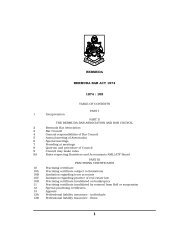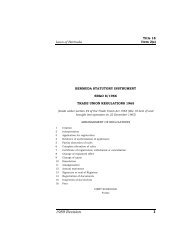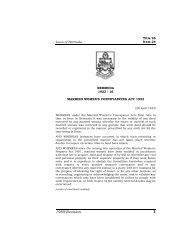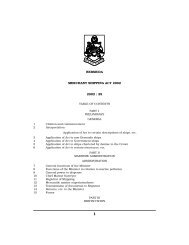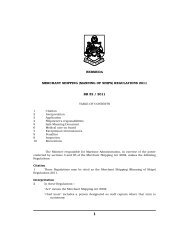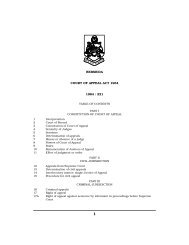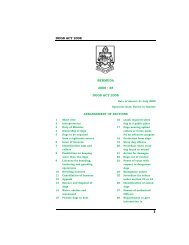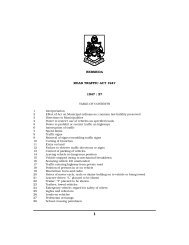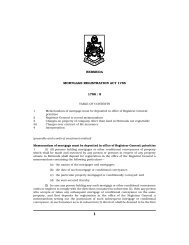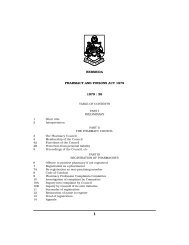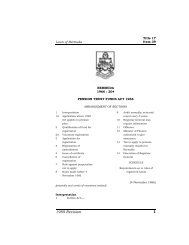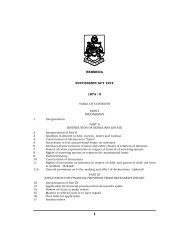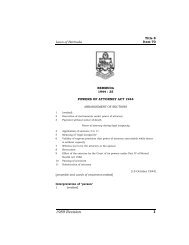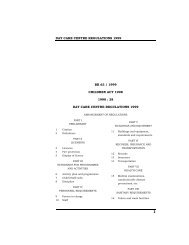Merchant Shipping (Prevention of Air Pollution from Ships ...
Merchant Shipping (Prevention of Air Pollution from Ships ...
Merchant Shipping (Prevention of Air Pollution from Ships ...
Create successful ePaper yourself
Turn your PDF publications into a flip-book with our unique Google optimized e-Paper software.
MERCHANT SHIPPING (PREVENTION OF AIR POLLUTIONFROM SHIPS) REGULATIONS 20054"gas oil" means —(a)(b)any petroleum derived liquid fuel falling within CN code2710 00 67 to 2710 00 68; orany petroleum derived liquid fuel which, by reason <strong>of</strong> itsdistillation limit, falls within the category <strong>of</strong> middledistillates intended for use as fuel and <strong>of</strong> which at least85 per cent by volume (including losses) distills at 350°Cby the ASTM D86 method;"Government ship" has the meaning given under section 4 <strong>of</strong> the<strong>Merchant</strong> <strong>Shipping</strong> Act 2002;"GT" means gross registered tonnage and the gross registeredtonnage <strong>of</strong> a ship having alternative gross registered tonnagesshall be taken to be the larger <strong>of</strong> those tonnages;"IAPP Certificate" means a certificate entitled the International<strong>Air</strong> <strong>Pollution</strong> <strong>Prevention</strong> Certificate issued in accordance withthe Convention;"IMO" means the International Maritime Organization;"ISO" means International Organisation for standardisation;"major conversion" means a modification <strong>of</strong> an engine where —(a)the engine is replaced by a new engine built on or afterthe 1st January 2000; or(b) any substantial modification, as defined in the NOxTechnical Code, is made to the engine; or(c)the maximum continuous rating <strong>of</strong> the engine isincreased by more than 10 per cent;"marine gas oil" means fuels intended for marine use which aregas oil or which have viscosity or density defined fallingwithin the ranges <strong>of</strong> viscosity or density defined for maritimedistillates in Table 1 <strong>of</strong> ISO 8217 (1996);"new installations" means the installation <strong>of</strong> systems, equipment,including new portable fire extinguishing units, insulation, orother material on a ship after 19th May 2005, but excludesrepair or recharge <strong>of</strong> previously installed systems, equipment,insulation, or other material, or recharge <strong>of</strong> portable fireextinguishing units;"NOx Technical Code" means the Technical Code on Control <strong>of</strong>Emission <strong>of</strong> Nitrogen Oxides <strong>from</strong> Marine Diesel Enginesadopted by Conference resolution 2 and includes anydocument amending it which is considered by the Minister tobe relevant <strong>from</strong> time to time;
MERCHANT SHIPPING (PREVENTION OF AIR POLLUTIONFROM SHIPS) REGULATIONS 2005(a)an oil tanker being a ship constructed or adaptedprimarily to carry oil in bulk in its cargo spaces andincludes combination carriers and a chemical tankerreferred to in sub-paragraph (b) when it is carrying acargo or part cargo <strong>of</strong> oil in bulk; and(b) a chemical tanker being a ship constructed or adaptedprimarily to carry a cargo <strong>of</strong> noxious liquid substancesin bulk and includes an oil tanker referred to in subparagraph(a) when carrying a cargo or a part cargo <strong>of</strong>noxious liquid substances in bulk.Applications and exemptions3 (1) Unless expressly provided otherwise, these Regulationsapply to —(a) Bermuda ships;(b) other ships while they are within Bermuda waters; and(c) Government ships registered in Bermuda andGovernment ships not so registered but held for thepurpose <strong>of</strong> Her Majesty's Government in Bermuda.(2) These Regulations do not apply to —(a) any warship, naval auxiliary or other ship owned oroperated by a State and used, for the time being, only ongovernment, non-commercial service; or(b) any emission necessary for the purpose <strong>of</strong> securing thesafety <strong>of</strong> a ship or saving life at sea; or(c) any emission resulting <strong>from</strong> damage to a ship or itsequipment —(i)(ii)provided all reasonable precautions have beentaken after the occurrence <strong>of</strong> the damage ordiscovery <strong>of</strong> the emission for the purpose <strong>of</strong>preventing or minimising the emission; orexcept if the owner or master acted either withthe intent to cause damage, or recklessly andwith knowledge that damage would probablyresult;(d) any emission <strong>from</strong> any ship arising directly <strong>from</strong> theexploration, exploitation and associated <strong>of</strong>fshoreprocessing <strong>of</strong> sea-bed mineral resources, including butnot limited to the flaring <strong>of</strong> hydrocarbons and theburning <strong>of</strong> cuttings, muds and stimulation fluids duringwell completion and testing operations, and flaring6
MERCHANT SHIPPING (PREVENTION OF AIR POLLUTIONFROM SHIPS) REGULATIONS 2005Power to deny entry and detain18 (1) If a harbour master has reason to believe that a ship whichhe believes proposes to enter the harbour does not comply with therequirements <strong>of</strong> these Regulations, he shall immediately report thematter to the Minister who, if he is satisfied that the ship presents anunreasonable threat <strong>of</strong> harm to the marine environment, may deny entry<strong>of</strong> such ship to Bermuda ports or <strong>of</strong>fshore terminals.(2) In any case where a ship to which these Regulations applyis suspected <strong>of</strong> a contravention <strong>of</strong> the requirements <strong>of</strong> these Regulations,the ship shall be liable to be detained.(3) Where a ship is liable to be detained under theseRegulations, section 242 <strong>of</strong> the <strong>Merchant</strong> <strong>Shipping</strong> Act 2002 (whichrelates to the detention <strong>of</strong> a ship) shall apply as if for the words "this Act"where they appear, there are substituted "the <strong>Merchant</strong> <strong>Shipping</strong>(<strong>Prevention</strong> <strong>of</strong> <strong>Air</strong> <strong>Pollution</strong> <strong>from</strong> <strong>Ships</strong>) Regulations 2005".(4) Where a ship other than a Bermuda ship is —(a) denied entry pursuant to paragraph (1); or(b) detained pursuant to paragraph (2),the Minister shall immediately inform the flag State <strong>of</strong> the ship or theappropriate authorities <strong>of</strong> that State.Offences19 (1) If any ship fails to comply with any requirement <strong>of</strong> theseRegulations, the owner and master <strong>of</strong> that ship commit an <strong>of</strong>fence andare punishable on summary conviction by a fine not exceeding$10,000.00 and on conviction on indictment by a fine not exceeding$20,000.00.(2) If a local fuel oil supplier or a local fuel oil supplier'srepresentative fails to comply with any requirement under theseRegulations or makes a false declaration in the bunker delivery note,each <strong>of</strong> them commits an <strong>of</strong>fence and is punishable on summaryconviction by a fine not exceeding $10,000.00 and on conviction onindictment by a fine not exceeding $20,000.00.(3) It shall be a defence for a person charged under paragraph(1) or (2) to show that he took all reasonable precautions and exercisedall due diligence to avoid the commission <strong>of</strong> the <strong>of</strong>fence.(4) Where an <strong>of</strong>fence under this regulation is committed, orwould have been committed save for the operation <strong>of</strong> paragraph (3), byany person due to the act or default <strong>of</strong> some other person, that otherperson commits the <strong>of</strong>fence, and a person may be charged with andconvicted for an <strong>of</strong>fence by virtue <strong>of</strong> this paragraph whether or notproceedings are taken against the first mentioned person.18
MERCHANT SHIPPING (PREVENTION OF AIR POLLUTIONFROM SHIPS) REGULATIONS 2005Offences by corporate bodies20 (1) Where a body corporate commits an <strong>of</strong>fence under theseRegulations and that <strong>of</strong>fence is proved to have been committed with theconsent or connivance <strong>of</strong>, or to be attributable to any neglect on the part<strong>of</strong> —(a) any director, manager, secretary or other similar <strong>of</strong>ficer<strong>of</strong> the body corporate; or(b) a person who was purporting to act in such capacity,he as well as the body corporate commit that <strong>of</strong>fence and are liable to beproceeded against and punished accordingly.(2) Where the affairs <strong>of</strong> a body corporate are managed by itsmembers, paragraph (1) shall apply in relation to the acts and defaults <strong>of</strong>a member in connection with his functions <strong>of</strong> management as if he werea director <strong>of</strong> the body corporate.(3) Where an <strong>of</strong>fence under these Regulations committed by apartnership is proved —(a) to have been committed with the consent or connivance<strong>of</strong>; or(b) to be attributable to any neglect on the part <strong>of</strong>,a partner, he as well as the partnership shall be guilty <strong>of</strong> that <strong>of</strong>fenceand shall be liable to be proceeded against and punished accordingly.Restriction on jurisdiction over <strong>of</strong>fences outside Bermuda limits21 (1) No proceedings for an <strong>of</strong>fence <strong>of</strong> contravening regulations11, 12, 13, 14 or 15 by a ship which is not a Bermuda ship, whichrelates to an emission in the internal waters, Territorial Waters orExclusive Economic Zone <strong>of</strong> another State shall be instituted unless —(a) that State, the flag state or a State damaged orthreatened by the emission requests that proceedings betaken; or(b) the emission has caused or is likely to cause pollution incontrolled waters or Bermuda waters.(2) Where proceedings for an <strong>of</strong>fence <strong>of</strong> contravening regulation11, 12, 13, 14 or 15 by a ship which is not a Bermuda ship which relatesto an emission in the internal waters, Territorial Sea or ExclusiveEconomic Zone <strong>of</strong> another State have been instituted but not concluded,and that State requests suspension <strong>of</strong> the proceedings, then —(a) proceedings shall be suspended; and(b) the Minister shall transmit all the evidence and courtrecords and documents relating to the case to that State.19
MERCHANT SHIPPING (PREVENTION OF AIR POLLUTIONFROM SHIPS) REGULATIONS 2005(3) It shall be a defence to a person charged with contraveningregulation 11, 12, 13, 14 or 15 for the defendant to show —(a) that the ship is not a Bermuda ship; and(b) the discharge took place outside controlled waters orBermuda waters; and(c) the ship was in a port <strong>of</strong> Bermuda at the time <strong>of</strong> theinstitution <strong>of</strong> proceedings by reason only <strong>of</strong> stress <strong>of</strong>weather or other reason beyond the control <strong>of</strong> the masteror owner or charterer.Suspension <strong>of</strong> proceedings at flag state request22 (1) This regulation relates to an alleged <strong>of</strong>fence <strong>of</strong> contraveningregulations 11, 12, 13, 14 or 15 by a ship which is not a Bermuda ship,in relation to a discharge outside Bermuda waters.(2) Any proceedings for such an <strong>of</strong>fence shall be stayed if thecourt is satisfied that the flag state has instituted proceedingscorresponding to the proceedings in Bermuda in respect <strong>of</strong> the emission,within 6 months <strong>of</strong> the institution <strong>of</strong> proceedings in Bermuda.(3) Paragraph (2) does not apply —(a) where the emission resulted in major damage toBermuda; or(b) the Minister certifies that the flag state has repeatedlydisregarded its obligation to enforce effectively therequirements <strong>of</strong> the Convention in respect <strong>of</strong> its ships.(4) Where proceedings instituted by the flag state have beenbrought to a conclusion, the suspended proceedings shall be terminated.Arbitration and compensation23 (1) Sections 104 and 105 <strong>of</strong> the <strong>Merchant</strong> <strong>Shipping</strong> Act 2002(arbitration and compensation) shall apply in relation to a detentionnotice under these Regulations as they apply to a detention notice undersection 103 subject to the modifications in paragraph (2).(2) The modifications referred to in paragraph (1) are —(a) references to "relevant inspector" means a personmaking an inspection under these Regulations;(b) section 104 shall apply in relation to a ship to whichthese Regulations apply as if the following words wereomitted —(i)in subsection (1) "in pursuance <strong>of</strong> section103(4)(b)";20
MERCHANT SHIPPING (PREVENTION OF AIR POLLUTIONFROM SHIPS) REGULATIONS 2005(ii)(iii)(iv)in subsection (2), the words <strong>from</strong> "unless" to theend;in subsection (3), "to whether the ship was orwas not a dangerously unsafe ship";in subsection (5), "as dangerously unsafe ship";and(c) section 105 shall apply in relation to a ship to whichthese Regulations apply as if for subsection (1) therewere substituted —"(1) If on reference under section 104 relating to adetention notice in relation to a ship, the owner <strong>of</strong> theship shows to the satisfaction <strong>of</strong> the arbitrator that —(a) any matter did not constitute a valid basisfor the relevant inspector's opinion; and(b) there were no reasonable grounds for theinspector to form that opinion,the arbitrator may award the owner such compensationin respect <strong>of</strong> any loss suffered by him in consequence <strong>of</strong>the detention <strong>of</strong> the ship as the arbitrator thinks fit.".SCHEDULESSCHEDULE 1 (Regulation 12)PART IENGINE EXCLUDED FROM REGULATION 12 BY VIRTUE OFTHE PROTOCOL OF 1997Engines excluded <strong>from</strong> regulation 12 by virtue <strong>of</strong> the Protocol <strong>of</strong> 19971. Regulation 12 does not apply to —(a) any equipment or other device intended to be used solelyin case <strong>of</strong> emergency including an emergency dieselengine and engines installed in lifeboats; and(b) engines installed on ships solely engaged in voyageswithin Bermuda waters provided that such engines aresubject to an alternative nitrogen oxide control measurethat has been approved by the Minister; or21
MERCHANT SHIPPING (PREVENTION OF AIR POLLUTIONFROM SHIPS) REGULATIONS 2005(c) any diesel engine the Minister has excluded <strong>from</strong> thisregulation which is installed on a ship constructed, orwhich undergoes a major conversion, before 19th May2005, provided the ship is solely engaged in voyages toports or <strong>of</strong>fshore terminals within Bermuda waters.PART IIFURTHER EXCLUSIONS OF SHIPS, ENGINES ANDCOMPONENTS FROM REGULATION 12Further exclusions <strong>of</strong> ships, engines and components <strong>from</strong> regulation 121 In this part <strong>of</strong> this Schedule —"major engine modification" means the modification <strong>of</strong> an enginewhich could potentially cause the engine to exceed theemission limits set out in the NOx Technical Code excludingroutine replacement <strong>of</strong> engine components that do not alterthe emission characteristics or increase the rated power <strong>of</strong>the engine by more than 15 per cent;"marine diesel engine" means any reciprocating internalcombustion engine operating on liquid or dual fuel, to whichregulations 5, 6 and 13 apply, including booster andcompound systems if applied;"recreational craft" means any boat <strong>of</strong> any type intended forsports and leisure purposes <strong>of</strong> hull length <strong>from</strong> 2.5 metres to24 metres measured according to the harmonised standard,fitted with a marine diesel engine <strong>of</strong> over 130 kW and whetherused for charter or recreational boating;"personal watercraft" means a vessel less than 4 metres in lengthwhich uses an internal combustion engine having a jet waterpump as its primary source <strong>of</strong> propulsion and designed to beoperated by a person sitting, standing or kneeling on, ratherthan within the confines <strong>of</strong> the hull;"propulsion engine" means any spark or compression ignition,internal combustion engine used for propulsion purposes,including two-stroke and four-stroke, inboard, stern-drivewith or without integral exhaust and outboard engines.2 Regulation 13 does not apply to —(a) recreational craft and partly completed craft;(b) personal watercraft;22
MERCHANT SHIPPING (PREVENTION OF AIR POLLUTIONFROM SHIPS) REGULATIONS 2005(c) marine diesel engines which are installed or specificallyintended for installation on or in recreational craft andpersonal watercraft;(d) marine diesel engines installed on or in recreational craftand personal watercraft that are subject to major enginemodification,to the extent that those items are not excluded under Part 1 <strong>of</strong> thisSchedule.1. The Technical FileSCHEDULE 2 (Regulation 12)NITROGEN OXIDESEvery marine diesel engine covered by regulation 12 must have atechnical file which identifies the engine's components, settings oroperating values which influence exhaust emissions. The technical filemust be prepared by the engine manufacturer and approved by therelevant Certifying Authority, and is required to accompany an enginethroughout its life on board the ship. It must be maintained in goodorder and not subjected to any unauthorised alteration, amendments,omission or deletions. The engine to which the technical file refers is tobe installed in accordance with the rating (kW and speed) and duty cycleas approved together with any limitation imposed by the technical file.2. The technical file must, at a minimum, contain the followinginformation ⎯(a) identification <strong>of</strong> those components, settings andoperating values <strong>of</strong> the engine which influence its NOxemissions;(b) identification <strong>of</strong> the full range <strong>of</strong> allowance adjustmentsor alternatives for the components <strong>of</strong> the engine;(c) a full record <strong>of</strong> the relevant engine's performance,including the engine's rated speed and rated power;(d) a system <strong>of</strong> on-board NOx verification procedures toverify compliance with the NOx emission limits duringon-board verification surveys;(e) a copy <strong>of</strong> the pre-certification test report;(f) if applicable, the designation and restrictions for anengine which is a member <strong>of</strong> an engine group or enginefamily;23
MERCHANT SHIPPING (PREVENTION OF AIR POLLUTIONFROM SHIPS) REGULATIONS 20052. Survey options(g) specifications <strong>of</strong> those spare parts or components which,when used in the engine, according to thosespecifications, will result in continued compliance <strong>of</strong> theengine with the NOx emission limits; and(h) the EIAPP Certificate.To ensure that engines are in compliance with regulation 12 afterinstallation, each engine with an EIAPP Certificate must be checked atleast once prior to issuance <strong>of</strong> the IAPP Certificate and at everyintermediate annual and renewal survey, using one <strong>of</strong> the three onboardNOx verification methods listed below ⎯(a) engine parameter check in accordance with 6.2 <strong>of</strong> theNOx Technical Code to verify that an engine'scomponent, setting and operating values have notdeviated <strong>from</strong> the specifications in the engine's technicalfile;(b) simplified measurement method in accordance with 6.3<strong>of</strong> the NOx Technical Code; or(c) the direct measurement and monitoring method inaccordance with 2.3.4, 2.3.5, 2.3.7, 2.3.8, 2.3.11, and5.5. <strong>of</strong> the NOx Technical Code.3. Engine parameter check methodIncluded in, or in addition to, the technical file described in paragraph 1<strong>of</strong> this Schedule the ship-owner or person responsible for ships equippedwith diesel engines must maintain on board the following document inrelation to the on-board NOx verification procedures specified inparagraph 2(d) <strong>of</strong> this schedule ⎯(a) a record book <strong>of</strong> engine parameters for recording all <strong>of</strong>the changes made relative to an engine's componentsand settings;(b) an engine parameter list <strong>of</strong> an engine's designatedcomponents and setting and the documentation <strong>of</strong> anengine's load-dependent operating values submitted byan engine manufacturer and approved by the CertifyingAuthority; and(c) technical documentation <strong>of</strong> an engine componentmodification when such a modification is made to any <strong>of</strong>the engine's designated engine components.3.2 Record book <strong>of</strong> engine parameters24
MERCHANT SHIPPING (PREVENTION OF AIR POLLUTIONFROM SHIPS) REGULATIONS 2005Descriptions <strong>of</strong> any changes affecting the designated engine parameters,including adjustments, parts replacements and modifications to engineparts, must be recorded chronologically in the engine's record book <strong>of</strong>engine parameters specified in 3(a) <strong>of</strong> this schedule. Those descriptionsmust be supplemented with any other applicable data used for theassessment <strong>of</strong> the engine's NOx levels. Any intended change to the NOxsensitive components or setting outside the limits listed in the technicalfile must be approved by the relevant Certifying Authority. Routinereplacement <strong>of</strong> engine components by parts specified in the technical filethat do not alter emission characteristics are not regarded as a"substantial modification" regardless <strong>of</strong> whether one part or many partsare replaced.4 Simplified methodWhere an engine covered by these regulations is fitted to a ship,constructed before 1 January 2000, has been modified the 'simplifiedmeasurement method' may be used to establish if the change can beregarded as a 'substantial modification' that will increase it's existingemission characteristics in excess <strong>of</strong> the allowances set out in 6.3.11 <strong>of</strong>the NOx technical code this method can also be used for the subsequentrenewal and intermediate surveys when required. This method is asimplified version <strong>of</strong> the full test-bed methodology and there are certainallowances which may be applied in calculating the final emissionsfigures to take account <strong>of</strong> possible deviations in instrument accuracy andthe presence <strong>of</strong> nitrogen in the fuel (see paragraph 6 <strong>of</strong> this Schedule).5 Direct measurement and monitoring methodDirect measurement and monitoring method must be carried out inaccordance with the applicable sections <strong>of</strong> chapters 2 and 5 <strong>of</strong> the NOxTechnical Code.6 Modifications to diesel enginesIf any adjustments or modifications are made to any engine after its precertification,a full record <strong>of</strong> such adjustments or modifications must berecorded in the engine's record book <strong>of</strong> engine parameters.If all <strong>of</strong> the engines installed on board are verified to remain within theparameters, components, and adjustable features recorded in thetechnical file, the engines should be accepted as performing within theNOx limits specified in regulation 12. In this case, with respect to thisCode, an IAPP Certificate may then be issued to the ship.If any adjustment or modification is made which is outside the approvedlimits documented in the technical file, the IAPP Certificate may beissued only if the overall NOx emission performance is verified to bewithin the required limits by ⎯25
MERCHANT SHIPPING (PREVENTION OF AIR POLLUTIONFROM SHIPS) REGULATIONS 2005(a) direct on-board NOx monitoring equipment,approved by a Competent Authority;(b)(c)a simplified on-board NOx measurement; orreference to the test-bed testing for the relevantengine group approval showing that theadjustments or modifications do not exceed theNOx emissions limits.Where an engine covered by these Regulations is fitted to a ship,constructed before 1 January 2000, has been modified and does nothave the necessary technical data to conduct a parameter check surveythe IAPP Certificate may be issued only if the overall NOx emissionperformance is verified to be within the required limits by ⎯(a) direct on-board NOx monitoring equipment,approved by a Competent Authority as described insection 5 <strong>of</strong> this Schedule; and(b)7 Second Hand Enginesthe simplified on board NOx measurement asdescribed in section 4 <strong>of</strong> this Schedule.Regulation 12(2)(a) does not apply to second hand engines manufacturedbefore 1 January 2000 which have been overhauled or re-conditioned ifthey replace existing engines in ships constructed before 1 January 2000as this does not constitute a major conversion under Regulation 12(2)(b). However, modifications which increase the maximum continuousrating <strong>of</strong> these engines by more than 10% or a substantial modificationare considered a major conversion and in such instances the NOxemission limits in Regulation 12 will apply. To establish whether amodification should be regarded as a substantial modification themethods described in section 4 or 5 <strong>of</strong> this schedule should be used.Regulation 12(2)(a) will apply to a new engine built on or after 1 January2000, which is replacing an engine in a new or existing ship.SCHEDULE 3 (Regulation 14)VOLATILE ORGANIC COMPOUNDSAll ports and terminals within Bermuda which would like to declare aVOC control area as provided for in regulation 14(1) must apply to theMinister for approval. The application must include the information onthe size <strong>of</strong> tankers to be controlled, the cargoes requiring vapouremission control systems and the date the port or terminal would likethe controls to start. The application must be submitted at least oneyear before the date that the port or terminal has applied for the VOCs tobe regulated.26
MERCHANT SHIPPING (PREVENTION OF AIR POLLUTIONFROM SHIPS) REGULATIONS 2005All vapour emission control systems within ports or terminals withinBermuda must be approved by the Minister in accordance withMSC/Circ 585, "Standards for Vapour Emission Control Systems".All Bermuda registered tankers which are subject to vapour emissioncontrol within a port or terminal that has been notified to the IMO underregulation 15 <strong>of</strong> the 1997 Protocol to MARPOL (Annex VI), shall beprovided with a vapour collection system taking into account MSC/Circ585, "Standards for Vapour Emission control Systems".All ships which are subject to vapour emission control in a port orterminal within Bermuda that has been approved by the Minister mustbe provided with a vapour collection system approved in accordance withMSC/Circ 585, "Standards for Vapour Emission Control Systems".Regulation 14 will only apply to gas carriers when the type <strong>of</strong> loading andcontainment systems allow safe retention <strong>of</strong> non-methane VOCs onboard or their safe return ashore.SCHEDULE 4 (Regulation 16)INFORMATION TO BE INCLUDED IN A BUNKER DELIVERYNOTE1 Name and International Maritime Organisation number <strong>of</strong>receiving ship;2 Port where delivery takes place;3 Date <strong>of</strong> commencement <strong>of</strong> delivery;4 Name, address and telephone number <strong>of</strong> fuel oil supplier;5 Product name;6 Quantity in metric tons;7 Density at 15ºC (kg/m 3 ) where the fuel has been tested inaccordance with 1SO 3675(a); and8 Sulphur content (%m/m) where the fuel has been tested inaccordance with ISO 8754(b).Made this 3 rd day <strong>of</strong> October, 200527
MERCHANT SHIPPING (PREVENTION OF AIR POLLUTIONFROM SHIPS) REGULATIONS 2005Minister <strong>of</strong> Tourism and Transport28



